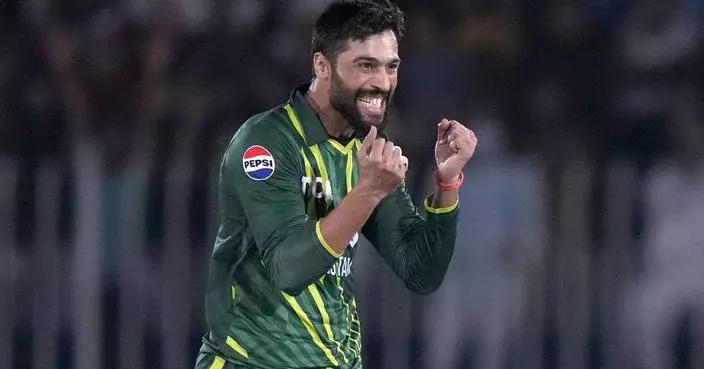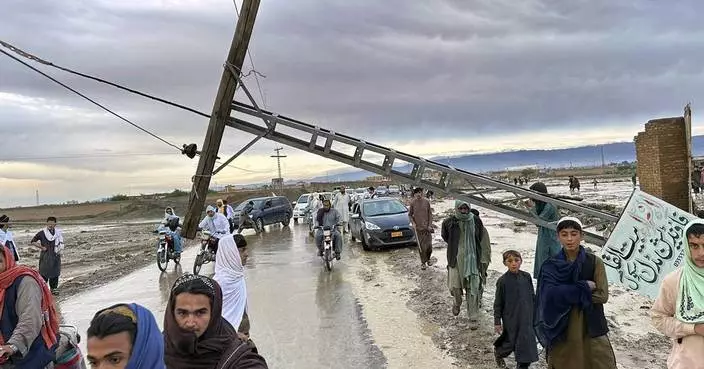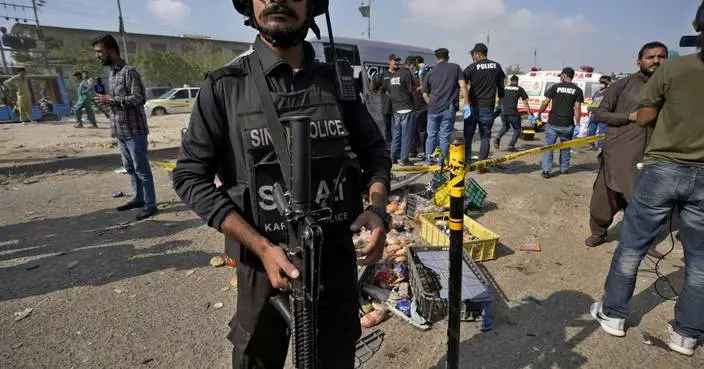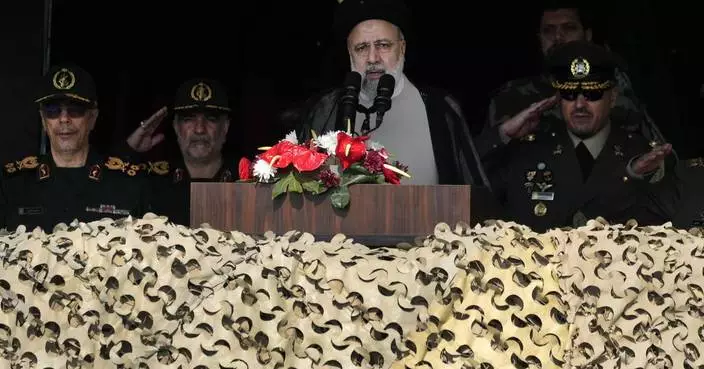Shakil Afridi has languished in jail for years — since 2011, when the Pakistani doctor used a vaccination scam in an attempt to identify Osama bin Laden's home, aiding U.S. Navy Seals who tracked and killed the al-Qaida leader.
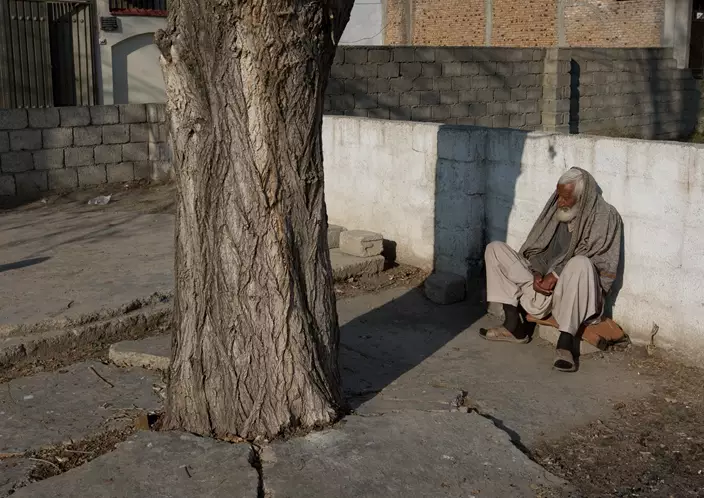
In this Jan. 7, 2018 photo, Zain Muhammad, a former watchman for Osama bin Laden outside bin Laden's house, in Abbottabad, Pakistan. (AP Photo/B.K. Bangash)
Americans might wonder how Pakistan could imprison a man who helped track down the mastermind of the 9/11 attacks. Pakistanis are apt to ask a different question: how could the United States betray its trust and cheapen its sovereignty with a secret nighttime raid that shamed the military and its intelligence agencies?
Click to Gallery
Shakil Afridi has languished in jail for years — since 2011, when the Pakistani doctor used a vaccination scam in an attempt to identify Osama bin Laden's home, aiding U.S. Navy Seals who tracked and killed the al-Qaida leader.
Americans might wonder how Pakistan could imprison a man who helped track down the mastermind of the 9/11 attacks. Pakistanis are apt to ask a different question: how could the United States betray its trust and cheapen its sovereignty with a secret nighttime raid that shamed the military and its intelligence agencies?
Mohammed Amir Rana, director of the independent Pakistan Institute of Peace Studies in Islamabad, said the trust deficit between the two countries is an old story that won't be rewritten until Pakistan and the U.S. revise their expectations of each other, recognize their divergent security concerns and plot an Afghan war strategy, other than the current one which is to both kill and talk to the Taliban.
In Nadeem's office, the wind whistles through a clumsily covered window shattered by a bullet. On another window, clear tape covers a second bullet hole, both from a shooting incident several years ago in which no suspects have been named. Another of Afridi's lawyers was gunned down outside his Peshawar home and a Peshawar jail deputy superintendent, who had advocated on Afridi's behalf, was shot and killed, said Nadeem.
If charged with treason — which Pakistani authorities say he committed — Afridi would have the right to public hearings and numerous appeals all the way to the Supreme Court, where the details of the bin Laden raid could be laid bare, something neither the civilian nor military establishments want, his lawyer said.
Pakistan and the Taliban sanctuaries it provides are a big part of the insurgents' success in Afghanistan, but it's only one of many factors, Kugelman said.
"We believe Dr. Afridi has been unjustly imprisoned and have clearly communicated our position to Pakistan on Dr. Afridi's case, both in public and in private," it said.
"The Shakil Afridi saga is the perfect metaphor for U.S-Pakistan relations" — a growing tangle of mistrust and miscommunication that threatens to jeopardize key efforts against terrorism, said Michael Kugelman, Asia program deputy director at the Woodrow Wilson Center in Washington.
The U.S. believes its financial support entitles it to Pakistan's backing in its efforts to defeat the Taliban — as a candidate, Donald Trump pledged to free Afridi, telling Fox News in April 2016 he would get him out of prison in "two minutes. ... Because we give a lot of aid to Pakistan." But Pakistan is resentful of what it sees as U.S. interference in its affairs.
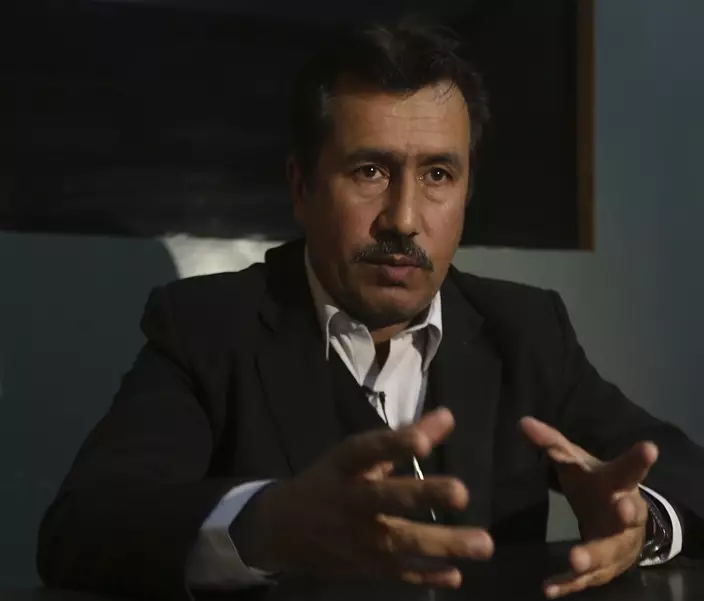
In this Jan. 4, 2018 photo, Qamar Nadeem Afridi, a lawyer and cousin of Dr. Shakil Afridi, speaks to The Associated Press, in Peshawar, Pakistan. (AP Photo/Muhammad Sajjad)
Mohammed Amir Rana, director of the independent Pakistan Institute of Peace Studies in Islamabad, said the trust deficit between the two countries is an old story that won't be rewritten until Pakistan and the U.S. revise their expectations of each other, recognize their divergent security concerns and plot an Afghan war strategy, other than the current one which is to both kill and talk to the Taliban.
"Shakil Afridi (is) part of the larger puzzle," he said.
Afridi hasn't seen his lawyer since 2012 and his wife and children are his only visitors. For two years his file "disappeared," delaying a court appeal that still hasn't proceeded. The courts now say a prosecutor is unavailable, his lawyer, Qamar Nadeem Afridi, told The Associated Press.
"Everyone is afraid to even talk about him, to mention his name," and not without reason, said Nadeem, who is also Afridi's cousin.
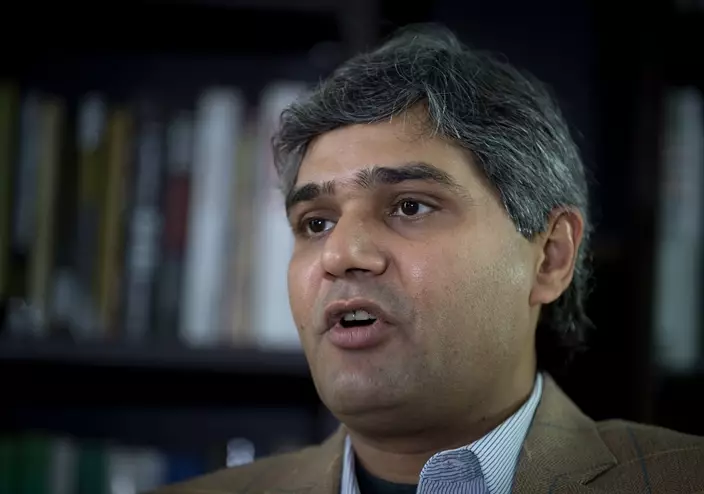
In this Jan. 8, 2018 photo, Mohammed Amir Rana, director of the independent Pakistan Institute of Peace Studies, speaks to The Associated Press, in Islamabad, Pakistan. (AP Photo/B.K. Bangash)
In Nadeem's office, the wind whistles through a clumsily covered window shattered by a bullet. On another window, clear tape covers a second bullet hole, both from a shooting incident several years ago in which no suspects have been named. Another of Afridi's lawyers was gunned down outside his Peshawar home and a Peshawar jail deputy superintendent, who had advocated on Afridi's behalf, was shot and killed, said Nadeem.
Afridi used a fake hepatitis vaccination program to try to get DNA samples from bin Laden's family as a means of pinpointing his location. But he has not been charged in connection with the bin Laden operation.
He was accused under tribal law alleging he aided and facilitated militants in the nearby Khyber tribal region, said Nadeem. Even the Taliban scoffed at the charge that was filed to make use of Pakistan's antiquated tribal system, which allows closed courts, does not require the defendant to be present in court, and limits the number of appeals, he said.
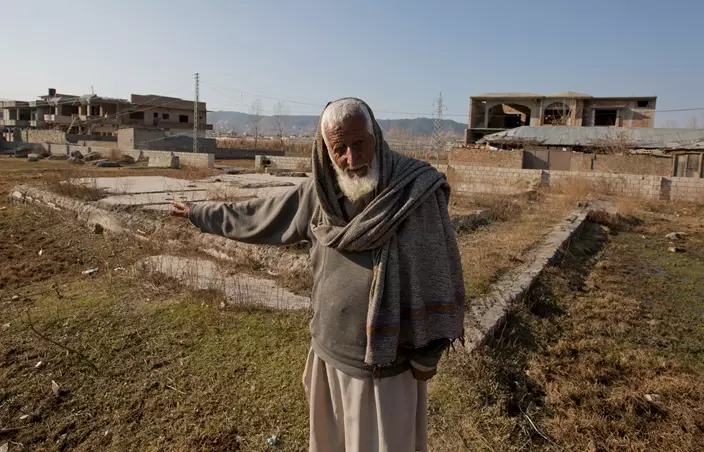
In this Jan. 7, 2018 photo, Zain Muhammad, a former watchman for Osama bin Laden talks about him at the remains of bin Laden's house, in Abbottabad, Pakistan. (AP Photo/B.K. Bangash)
If charged with treason — which Pakistani authorities say he committed — Afridi would have the right to public hearings and numerous appeals all the way to the Supreme Court, where the details of the bin Laden raid could be laid bare, something neither the civilian nor military establishments want, his lawyer said.
Tensions have grown between Pakistan and the U.S. since Trump's New Year's Day tweet in which he accused Pakistan of taking $33 billion in aid and giving only "deceit and lies" in return while harboring Afghan insurgents who attack American soldiers in neighboring Afghanistan. Days later, the U.S. suspended military aid to Pakistan, which could amount to $2 billion.
Infuriated by Trump's tweet, Pakistan accused Washington of making it a scapegoat for its failure to bring peace to Afghanistan.
The Wilson Center's Kugelman advocated a "scaled-down relationship" between the two countries. He said both sides need to agree to disagree on some issues and instead focus on those areas where they can agree to cooperate against terror groups that both regard as threats, including the Islamic State group and al-Qaida.
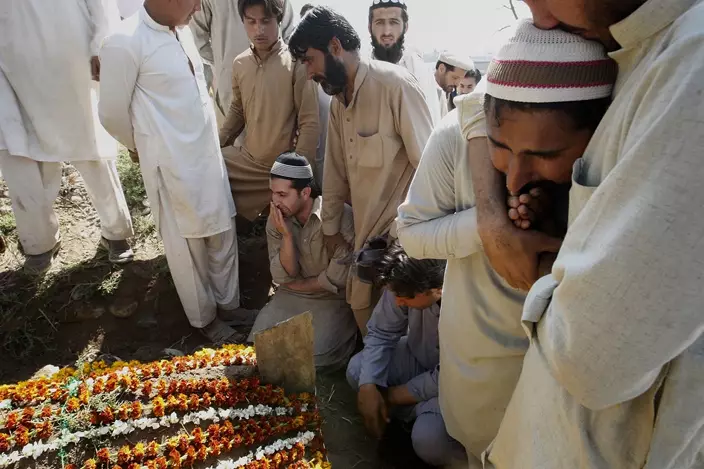
FILE - In this March 18, 2015 file photo, Pakistani villagers and family members mourn during the funeral of Pakistani lawyer Samiullah Khan Afridi, who was killed months after he announced that he will no longer be representing Dr. Shakil Afridi, in Peshawar, Pakistan.(AP Photo/Mohammad Sajjad, File)
Pakistan and the Taliban sanctuaries it provides are a big part of the insurgents' success in Afghanistan, but it's only one of many factors, Kugelman said.
"It's foolish to suggest that if the Pakistani sanctuaries were eliminated, the insurgency would magically go away and the U.S. would be able to prevail in Afghanistan," he said. "The Taliban has persevered because the U.S. still struggles to fight wars against non-state actors, and because the Afghan government has remained a weak and corrupt entity that has failed to convince a critical mass of Afghans that it's a better alternative to the Taliban."
Afridi spends his days alone, isolated from a general prison population filled with militants who have vowed to kill him for his role in locating bin Laden, said Nadeem. Still, Nadeem said authorities are treating Afridi well and he is in good health, according to those who have seen him.
There was a no indication whether U.S. Acting Assistant Secretary of State Alice Wells brought Afridi's case up in recent meetings in Pakistan. But in a statement, the U.S. State Department told the AP that Afridi has not been forgotten.
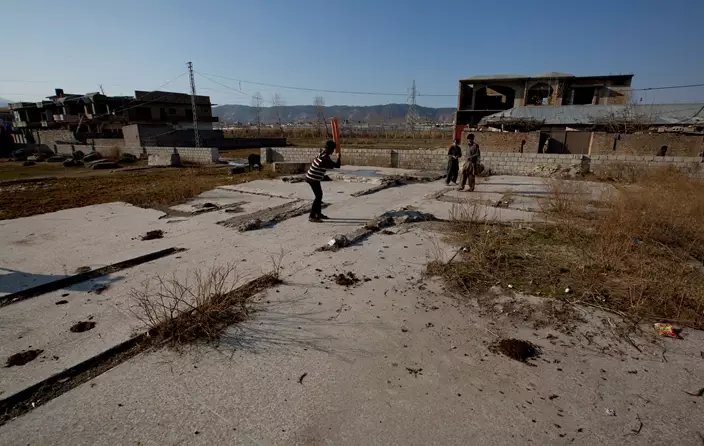
In this Jan. 7, 2018 photo, Pakistani boys play cricket on the remains of Osama bin Laden's home in Abbottabad, Pakistan. (AP Photo/B.K. Bangash)
"We believe Dr. Afridi has been unjustly imprisoned and have clearly communicated our position to Pakistan on Dr. Afridi's case, both in public and in private," it said.
In the past, Pakistan has compared Afridi's dilemma with demands for the release of Afia Siddiqui, a Pakistani woman who is in U.S. custody convicted of trying to kill an American soldier in Afghanistan.
"To America, she (Siddiqui) is a terrorist," said Kugelman. "To Pakistan, she is a wrongfully imprisoned innocent."
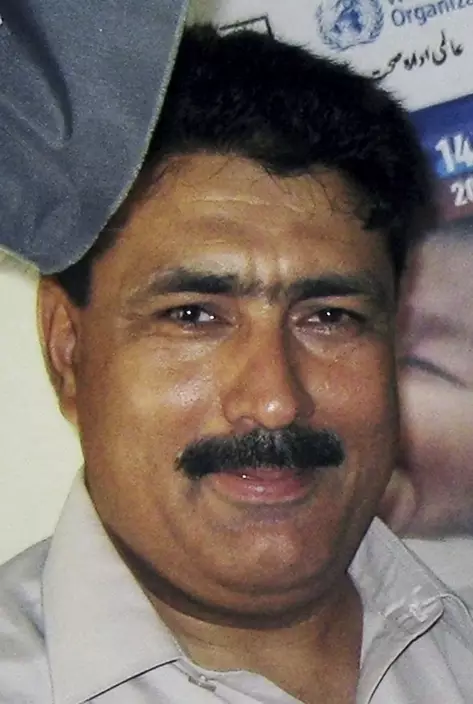
FILE - In this July 9, 2010 file photo, Pakistani doctor Shakil Afridi is photographed in the Jamrud tribal area, Khyber region of Pakistan. (AP Photo/Qazi Rauf, File)
ISLAMABAD (AP) — The leaders of Iran and Pakistan agreed to strengthen economic and security cooperation in a meeting on Monday that sought to smooth over a diplomatic rift.
Ties were strained between the neighbors in January when each carried out strikes in the other’s territory, targeting militants accused of attacking security forces.
Iran’s President Ebrahim Raisi met with Pakistani Prime Minister Shehbaz Sharif and other officials on his three-day visit. Authorities deployed hundreds of additional police and paramilitary forces for security.
Pakistan has witnessed a surge in militant violence in recent months, mostly blamed on Pakistani Taliban and insurgents targeting security forces in Pakistan and neighboring Iran.
According to a statement, the two leaders discussed a range of bilateral issues and vowed to cooperate to fight terrorism. They reiterated their condemnations of Israel's war against Hamas in Gaza.
Sharif praised Iran’s “strong stand on the issue of Palestine” and said “Pakistan is also with the Palestinians.”
Raisi said the killings by Israel in Gaza were being committed with the support of the United States and other Western countries. He criticized international organizations, including the United Nations, saying, “They say they support human rights, but they proved that they are inefficient.”
The visit comes after Iran’s unprecedented direct strikes on Israel and an apparent Israeli response. Pakistan is among the countries that have no diplomatic relations with Israel because of the issue of Palestinian statehood.
Raisi also vowed to boost what he called “unacceptably” meager bilateral trade with Pakistan and called for setting up more border markets. Pakistan and Iran set up the first such border market in southwestern Pakistan's Baluchistan province last year, promising five more under a 2012 agreement.
The two leaders signed eight cooperation agreements, according to Sharif's office.
Authorities said the two sides also discussed a multi-billion gas pipeline project, on hold since 2014. The project — opposed by Washington as a violation of sanctions imposed on Tehran over its nuclear program — launched in 2013 to supply Iranian natural gas to energy-starved Pakistan.
Iran says it had already completed the pipeline on its side of the border after investing $2 billion. Pakistan was supposed to finish construction on its territory by the end of 2014 but work stalled, leading to tensions between the nations.
The Iranian president later met with his Pakistani counterpart Asil Ali Zardari, who helped launch the pipeline project after traveling to Iran in 2013.
On Monday night, Pakistan's powerful army chief Gen. Asim Munir met with the Iranian president, the military said in a statement. It said their discussion focused on "matters of mutual interest, notably regional peace, stability and border security.”
The statement said Munir described the Pakistan-Iran border as “the border of peace and friendship" but emphasized the need for improved coordination there “to prevent terrorists from jeopardizing the longstanding brotherly relations.”
It quoted Raisi as saying that by fostering cooperation between the militaries, Iran and Pakistan “can attain peace and stability for both nations and the region."
Raisi also met with Pakistan's Foreign Minister Ishaq Dar. The two discussed regional and global developments and “affirmed commitment to peace and constructive dialogue for resolving regional challenges."
Raisi is accompanied by his spouse and a high-level delegation. He plans to visit Karachi, Pakistan's biggest city, and Lahore, where he will meet with the country's recently elected first female chief minister, Maryam Nawaz Sharif.
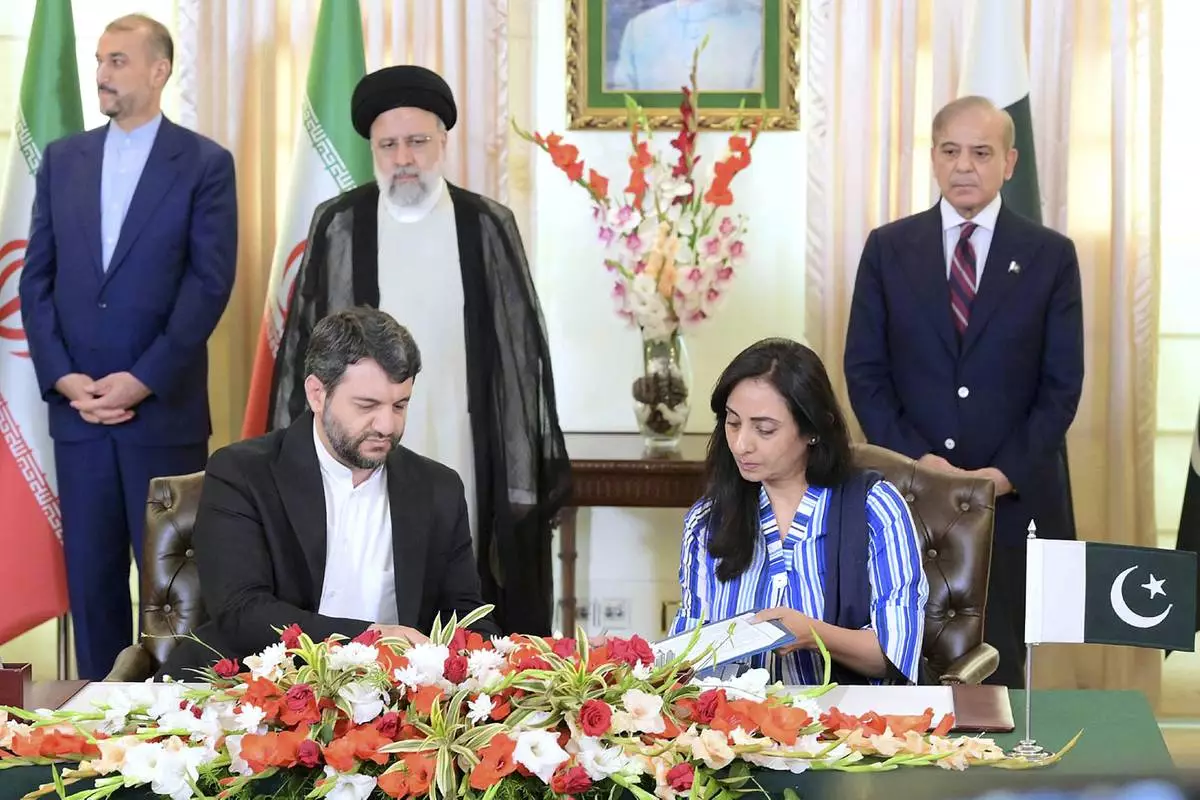
In this photo released by Press Information Department, Iranian President Ebrahim Raisi, second left back, with Pakistan's Prime Minister Shehbaz Sharif, right back, witness a signing of MoUs of cooperation in different fields between Iran and Pakistan at prime minister house in Islamabad, Pakistan, Monday, April 22, 2024. Iranian and Pakistani leaders vowed to strengthen economic and security cooperation in a meeting on Monday, as the two countries seek to smooth over a diplomatic rift. (Press Information Department via AP)
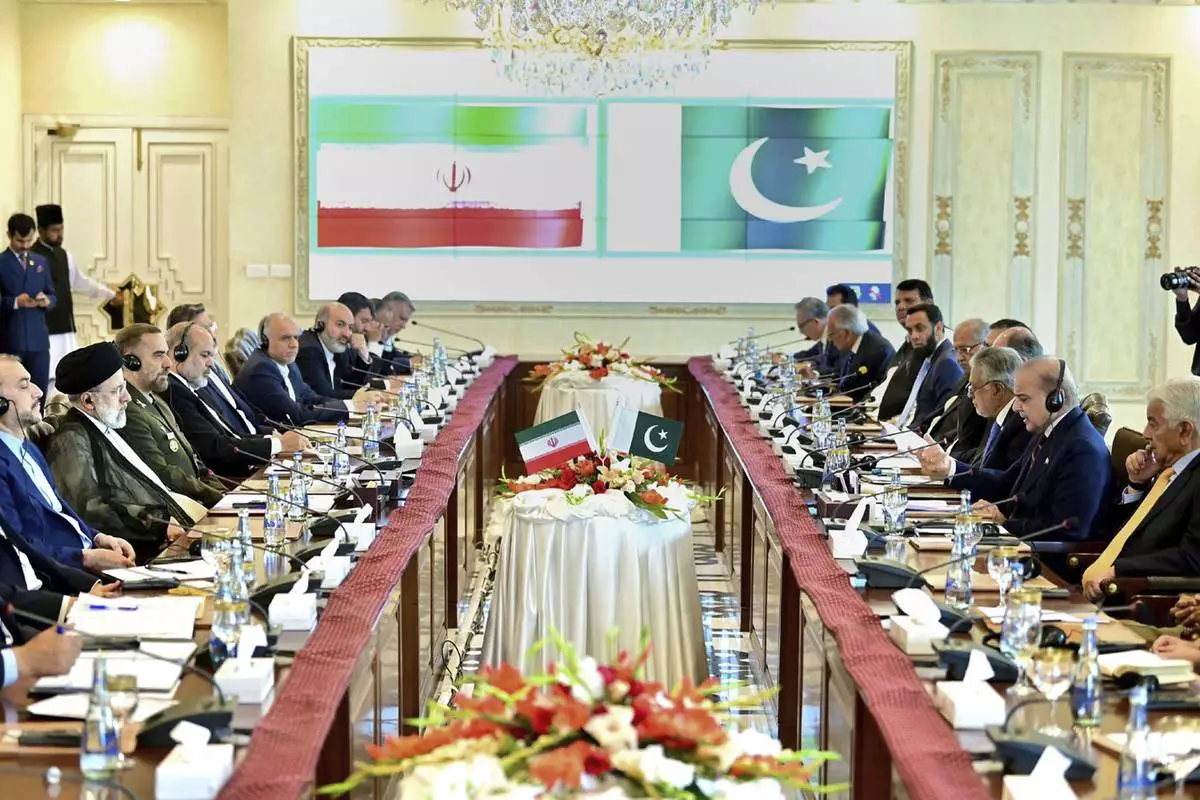
In this photo released by Press Information Department, Iranian President Ebrahim Raisi, second left, holds official talks with Pakistan's Prime Minister Shehbaz Sharif, second right, at prime minister house in Islamabad, Pakistan, Monday, April 22, 2024. Iranian and Pakistani leaders vowed to strengthen economic and security cooperation in a meeting on Monday, as the two countries seek to smooth over a diplomatic rift. (Press Information Department via AP)
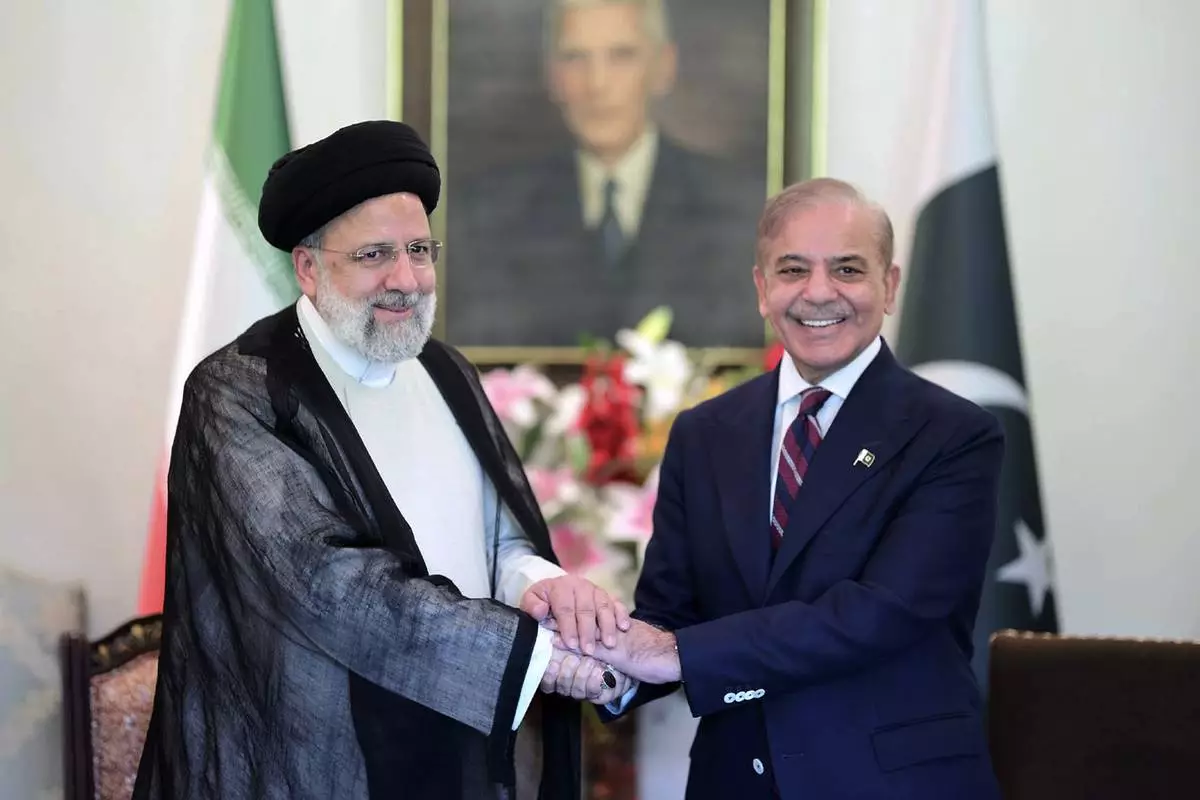
In this photo released by Press Information Department, Iranian President Ebrahim Raisi, left, shakes hand with Pakistan's Prime Minister Shehbaz Sharif prior to their meeting at prime minister house in Islamabad, Pakistan, Monday, April 22, 2024. Iranian and Pakistani leaders vowed to strengthen economic and security cooperation in a meeting on Monday, as the two countries seek to smooth over a diplomatic rift. (Press Information Department via AP)
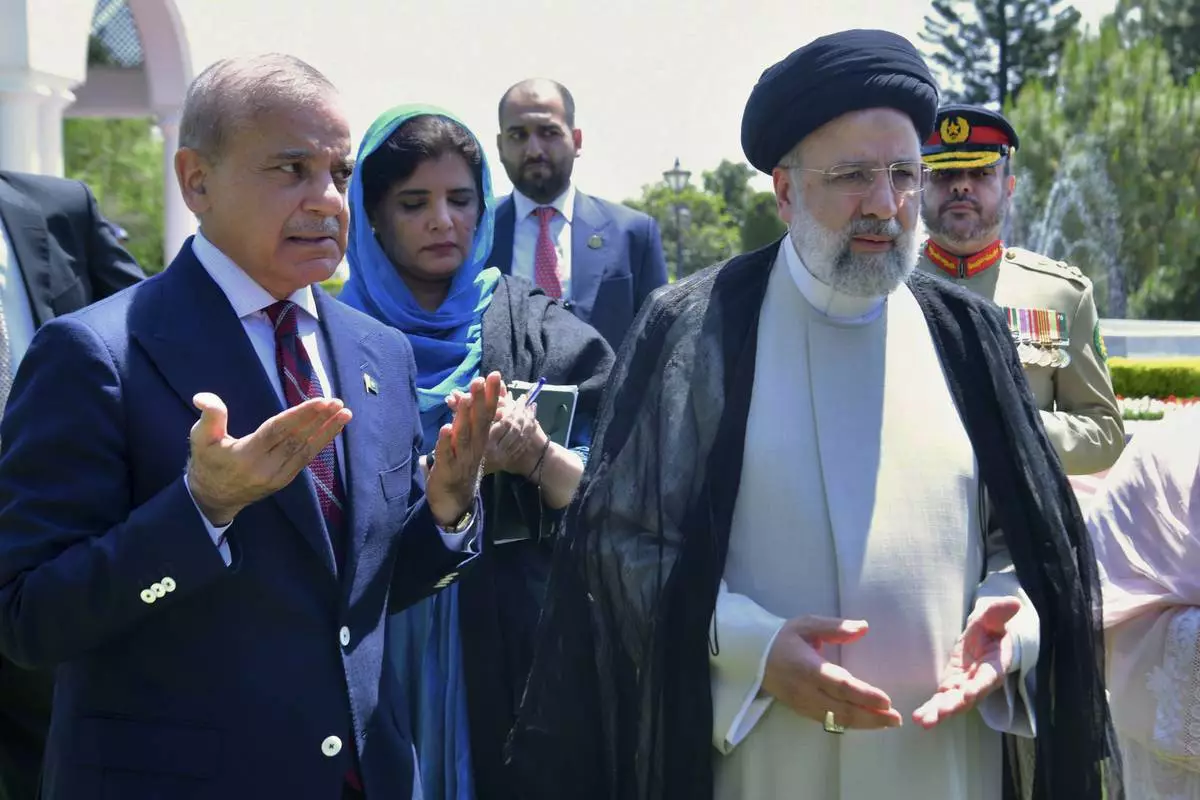
In this photo released by Prime Minister Office, Iranian President Ebrahim Raisi, right, with Pakistan's Prime Minister Shehbaz Sharif, left, prays after planting a tree in the prime minister house in Islamabad, Pakistan, Monday, April 22, 2024. (Prime Minister Office via AP)
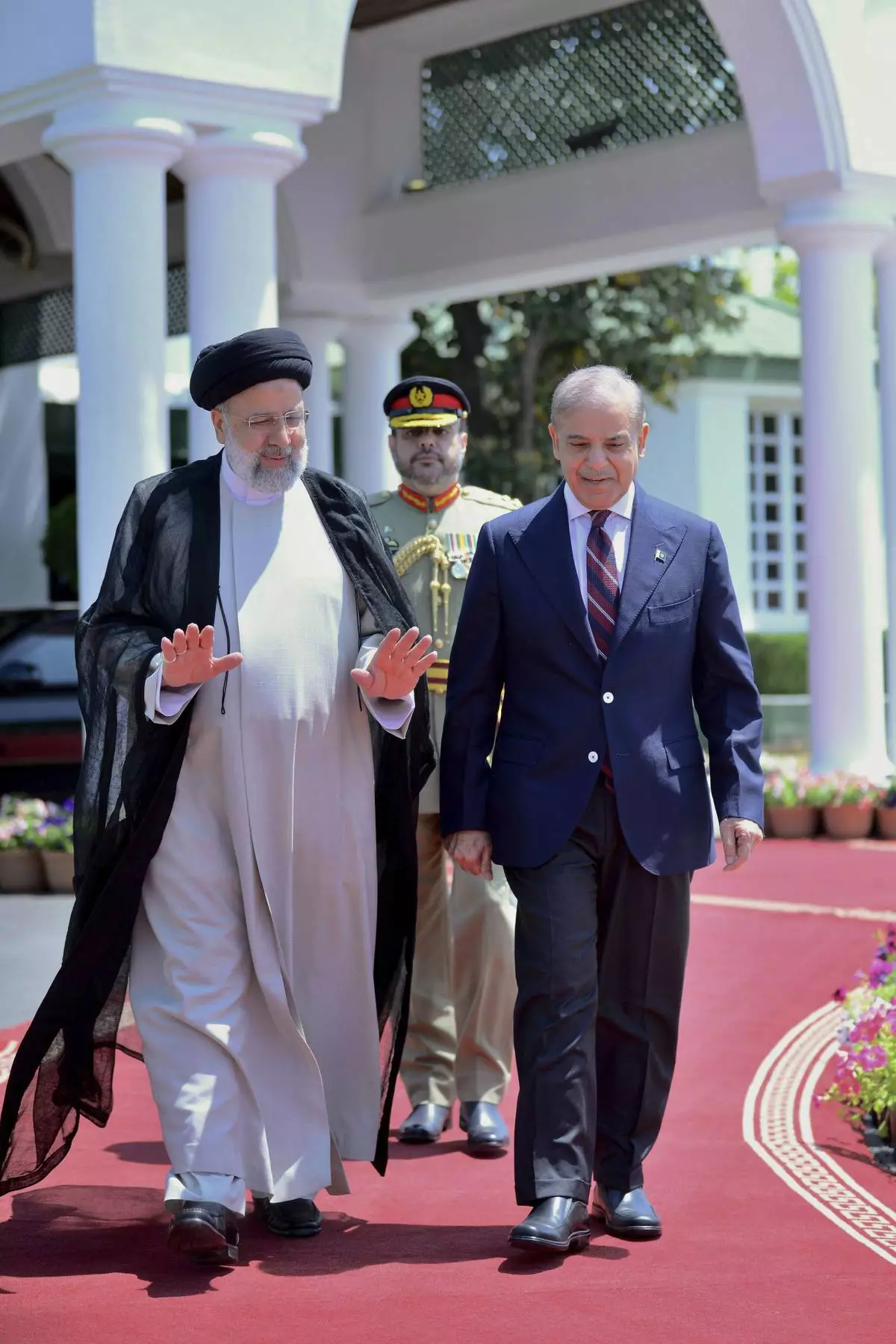
In this photo released by Prime Minister Office, Iranian President Ebrahim Raisi, left, walks with Pakistan's Prime Minister Shehbaz Sharif during a welcome ceremony in the prime minister house in Islamabad, Pakistan, Monday, April 22, 2024. (Prime Minister Office via AP)
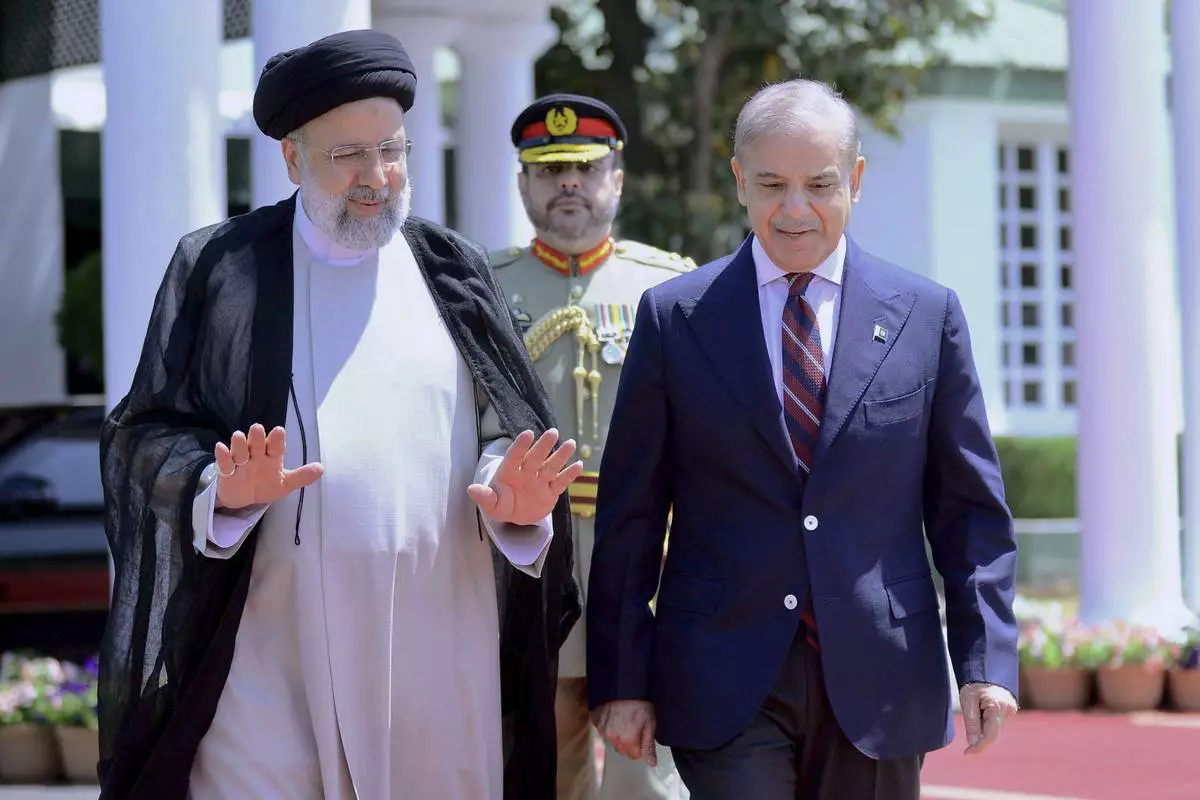
In this photo released by Prime Minister Office, Iranian President Ebrahim Raisi, left, walks with Pakistan's Prime Minister Shehbaz Sharif during a welcome ceremony in the prime minister house in Islamabad, Pakistan, Monday, April 22, 2024. (Prime Minister Office via AP)
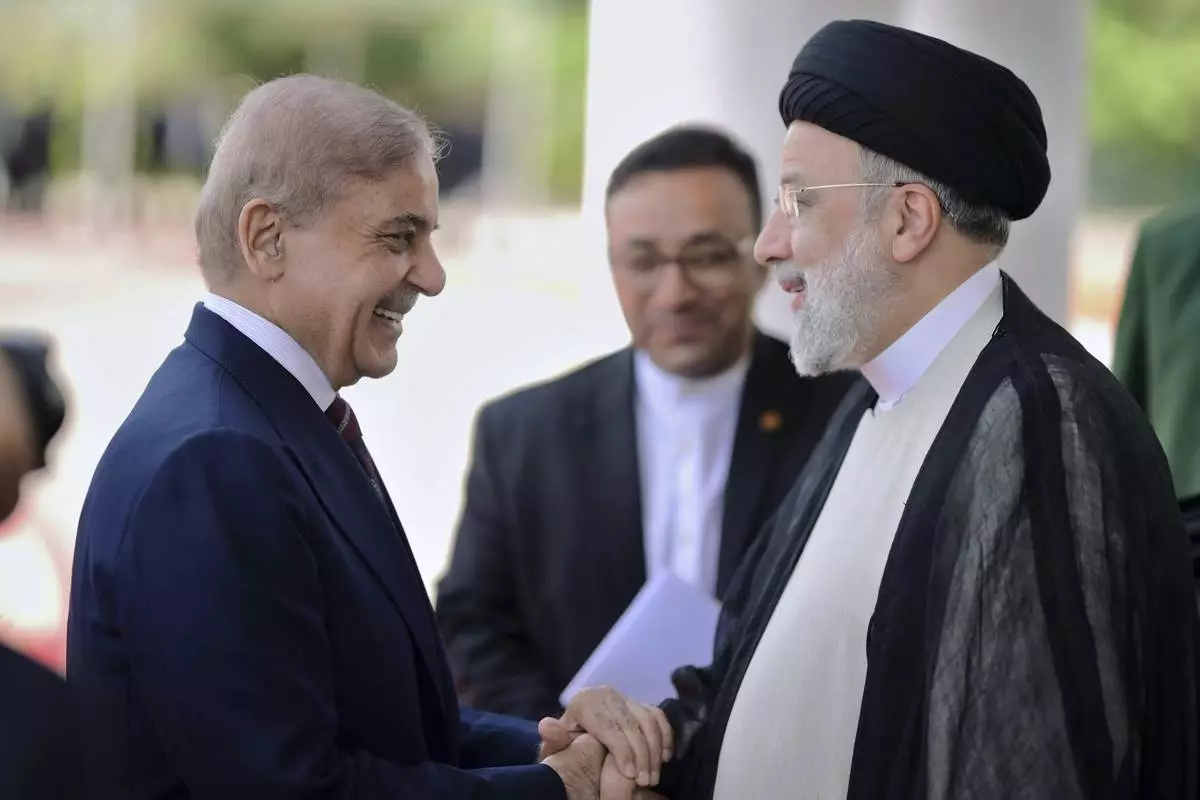
In this photo released by Prime Minister Office, Pakistan's Prime Minister Shehbaz Sharif, left, greets to Iranian President Ebrahim Raisi upon his arrival in the prime minister house in Islamabad, Pakistan, Monday, April 22, 2024. (Prime Minister Office via AP)
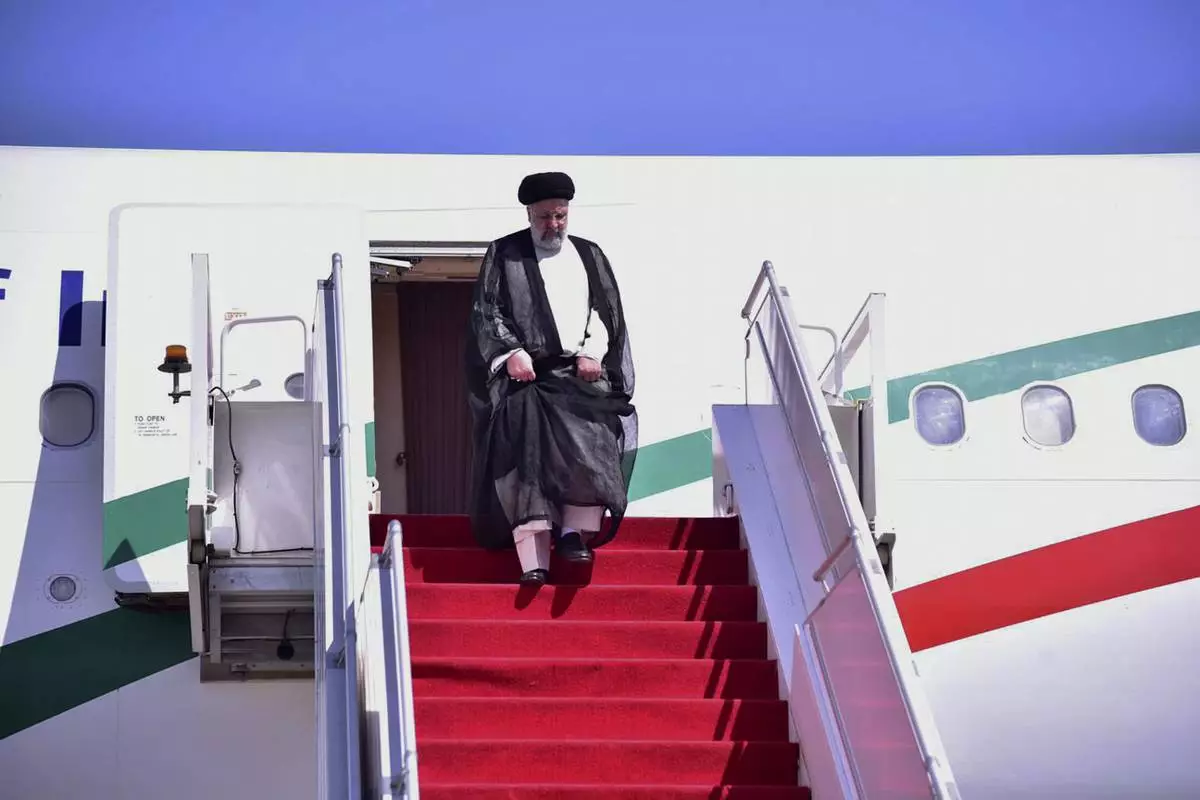
In this photo released by Pakistan's Ministry of Foreign Affairs, Iranian President Ebrahim Raisi gets down from plane upon his arrival in Islamabad, Pakistan, Monday, April 22, 2024. Raisi arrived in Islamabad on a three-day visit on Monday, during which he will discuss a range of issues with authorities in Pakistan's capital, officials said. (Ministry of Foreign Affairs via AP)




















